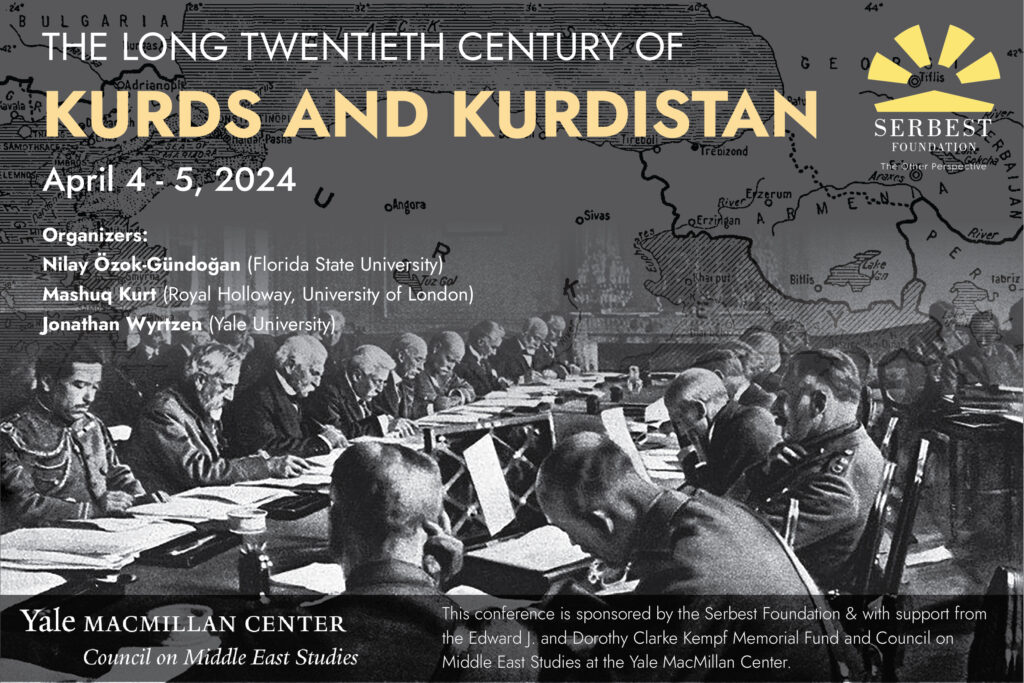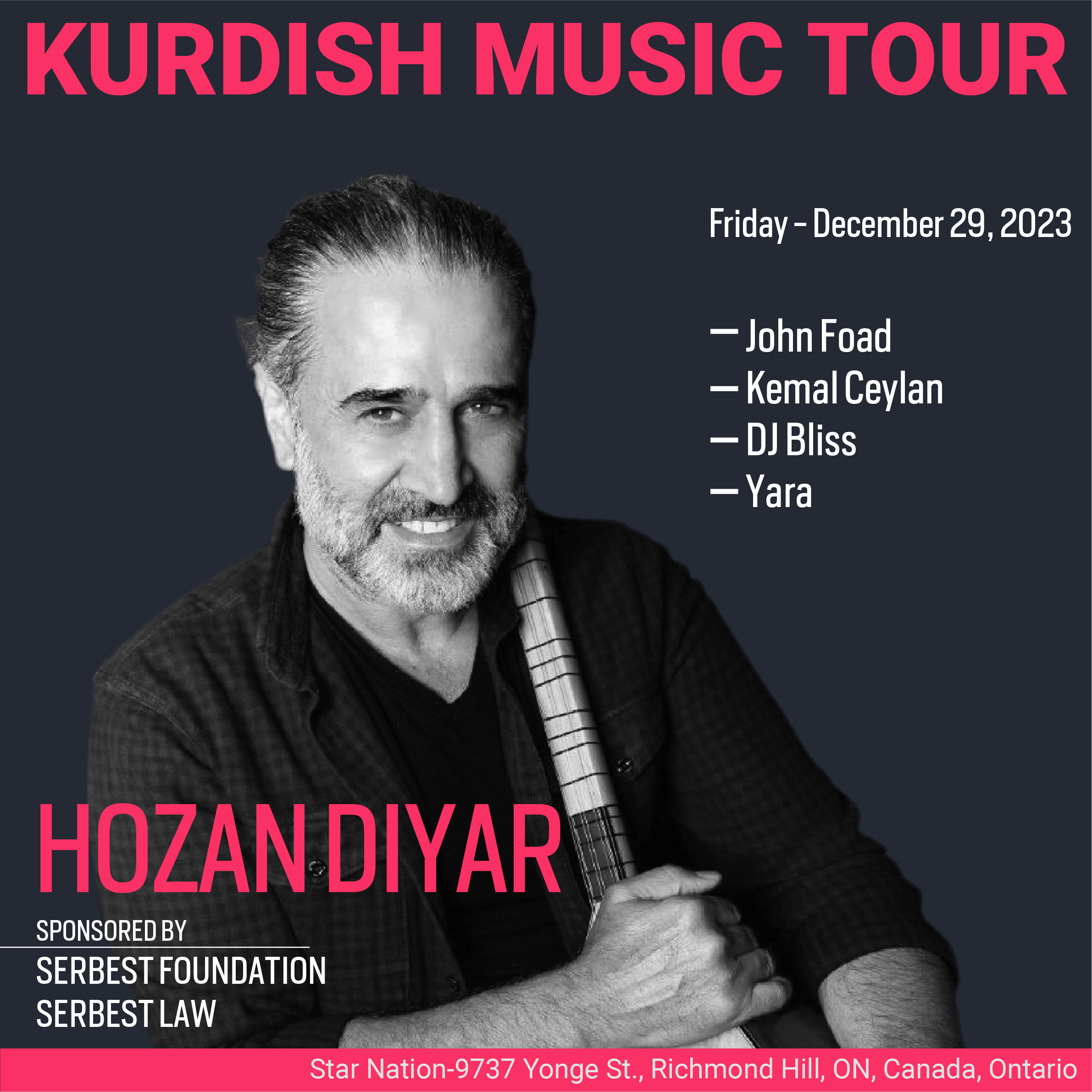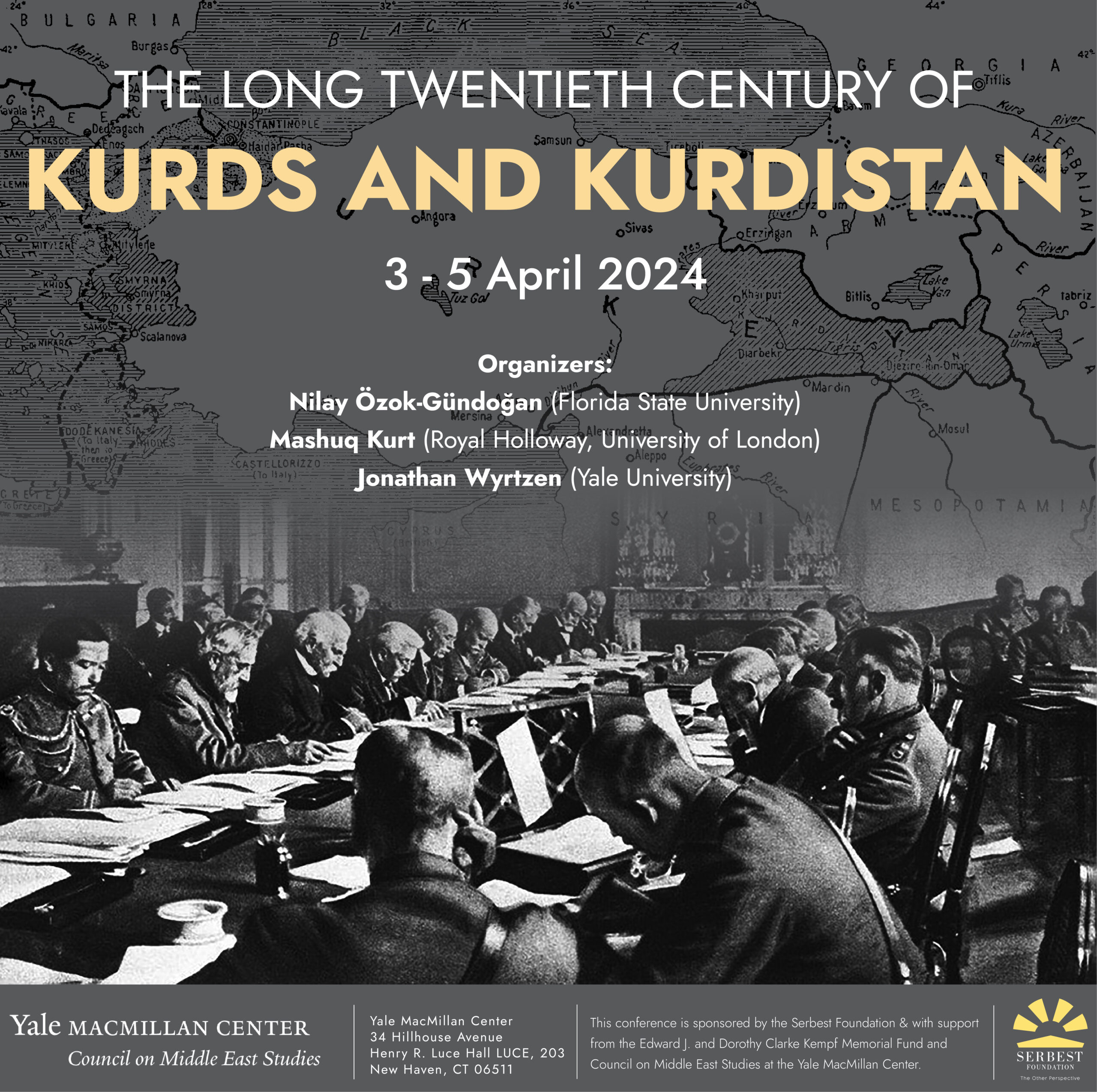
THE LONG TWENTIETH CENTURY OF KURDS AND KURDISTAN APRIL 4-5, 2024
This conference is sponsored by the Serbest Foundation & with support from the Edward J. and Dorothy Clarke Kempf Memorial Fund and Council on Middle East Studies at the Yale University MacMillan Center
Organizers:
Nilay Özok-Gündoğan (Florida State University)
Mashuq Kurt (Royal Holloway, University of London)
Jonathan Wyrtzen (Yale University)
SESSION 1: THE LONG TWENTIETH CENTURY OF KURDS
Moderator: Jonathan Wyrtzen
- Sabri Ateş (Southern Methodist University)
“We, the Nation: On Five Letters of Shaykh Ubeidullah Nehrî”
- Naif Bezwan (University of Vienna)
“Grasping the Kurdish Self-determination Conflict through the Treaty of Lausanne”
- Janet Klein (The University of Akron)
“Violence in Kurdistan: A Historiography of the Long Twentieth Century”
SESSION 2: WORLD WAR I, SELF-DETERMINATION, AND MINORITIZATION
Moderator: Sabri Ateş
- Veysel Şimşek (McGill University)
“Military Mobilization and Mass Violence: Kurds and Kurdistan during the First World War, 1914-1918”
- Loqman Radpey (University of Edinburgh)
“Decoding the Contemporary Middle East: Kurdistan’s Quest for Self-Determination”
- Cevat Dargın (University of Michigan)
“Race, Rhetoric, and Rebellion: Afterlives of Ottoman Collapse in the Making of Dersim Thirty-Eight”
- Veli Yadirgi (LSE)
“Fluxes in the Socio-economic Structures in Kurdistan in the Long Twentieth Century: From Development to De-development”
SESSION 3: KURDISH POLITICAL LEADERSHIP
Moderator: Nilay Özok-Gündoğan
- Metin Atmaca (Social Sciences University of Ankara)
“Sheikhs, Merchants and Notables: Troubled times of Sulaymaniyah in the early 20th Century”
- Kamal Soleimani (El Colegio de Mexico)
“The Treaty of Lausanne and Its Impact on the Caliphate’s Role Among the Kurds”
- Dmitrii Asinovskii (Central European University)
“ Barzani Kurds in the Soviet Union: Fugitives, Separatists, Aliens”
- Jihan Mohammed (Vanderbilt University)
“Iraqi Kurds: The Dream of Nation State”
SESSION 4: CULTURE, DISCOURSE, AND IDENTITY
Moderator: Mashuq Kurt
- Rüstem Ertuğ Altınay (University of Milan)
“Dark Utopias: Militarism and Turkification in Late Ottoman Youth Theatre”
- Jon Bullock (University of Notre Dame)
“‘They Did It for the Culture’: Kurdish Music Broadcasting as a Site of Resistance”
- Loghman Hamehmorad (University College Dublin)
“The Historical Contexts of the Hegemonizing Kurdish Nationalism Discourse in Iranian Kurdistan”
- Vera Eccarius-Kelly (Siena College)
“Decolonial Aesthetics and Diasporic Kurdish Discernment”
SESSION 5: GENDER, YOUTH, AND POLITICAL CONFLICT
Moderator: Nadje Al-Ali
- Shilan Fuad Hussain (Middlesex University)
“ From the Margins to the Main Stage: Centering the Impact of the Lausanne Treaty on the Lives of Women”
- Barış Öktem (Royal Holloway University of London)
“Identity Formation and Political Engagement: Understanding Contemporary Kurdish Youth in Historical Context”
- Clara Rasouli (University of Oslo)
“‘Women Who Face Death’: Understanding Motivational Factors for Female Peshmergas in the PDKI”
- Katia Zagoritou (University of Peloponnese)
“The impact of the Lausanne Treaty on the Kurds in Syria”
SESSION 6: ENERGY/RESOURCES/ENVIRONMENT/SPACE
Moderator: Veli Yadırgı
- Fidan Mirhanoglu (Paris Business School)
“Kurdish Statehood and Colonial Oil: The French Policy of Petroleum in Kurdistan a Century Apart”
- Rebecca Irvine (CUNY)
“Tracing Malaria in 1950 and 60s Iraqi Kurdistan: Environment, War and Disease”
- Turan Keles (University of Central Florida)
“Public Investment as a Counterinsurgency Strategy: A Quantitative Analysis of Turkish State Policies in Kurdish Regions (1960-2020)”
- Avin Haris & Mohammad Shareef (University of Kurdistan Hewlêr)
“Climate Change Challenge of a Stateless Nation: Implications of Geopolitically Induced Water Scarcity on the Kurdistan Region of Iraq”
SESSION 7: INTERCOMMUNAL RELATIONS
Moderator: Janet Klein
- Diana Yayloyan (Georgetown University)
“Exploring Armenian-Kurdish Relations in the late Ottoman East: Testimony of Yervant Kureghian”
- Hasmik Grigoryan (Clark University)
“1914 Kurdish Uprising in Bitlis: The Response in the Armenian Press”
- Stan Thangaraj (Stonehill College)
“Constantinople Cafe and Copper Binds: Kurds, Lebanese, and the Emergence of Butte, Montana”
- Kerem Can Uşşaklı (Stanford University)
“The Social Fingerprint: Personal Identification and the Sovereignty of Incorporation at the Kurdish-Iraqi Borderlands”
Closing Remarks and Round-table: Future of the Kurds in the Middle East
Moderator: Aslı Ü. Bâli
Mashuq Kurt, Nilay Özok-Gündoğan, Jonathan Wyrtzen, Nadje Al-Ali, Metin
Serbest and all participants

The Long Twentieth Century of
Kurds and Kurdistan
March 31 – April 1, 2024, Yale University
Yale University’s Council on Middle East Studies (CMES) kindly welcomes you to submit abstracts to present your research at an international conference on The Long Twentieth Century of Kurds and Kurdistan. 2023 marks the centenary of the Treaty of Lausanne, the agreement that brought an end to hostilities between the Allied Powers and the Turkish Republic. The Treaty of Lausanne eventually established new borders and recognized the sovereignty of the Turkish state, shaping the geopolitical landscape of the region for decades to come. As we commemorate this centenary, it is essential to reflect on the historical significance and lasting impact of this pivotal agreement on Kurds and Kurdistan.
The Treaty of Lausanne holds particular importance for two reasons within the context of post-World War I treaties. Firstly, it solidified the emerging international order after the war, which was founded on the principle (though only partially observed) of self-determination and the recognition of sovereignty in the form of nation-states. Secondly, and directly relevant to the conference’s theme, the treaty exclusively granted international recognition to the Turkish nation-state, effectively rendering the aspirations for Kurdish self-determination nearly impossible. Consequently, the Kurds persist as the largest ethnic group in the Middle East devoid of a sovereign state to present day.
The 1923 treaty was the culmination of a series of historical milestones related to the fall of the Ottoman Empire. These milestones include the Great War, the Paris Peace Conference, and the 1920 Sèvres Treaty. Throughout these critical junctures, Kurdish political elites actively pursued various political agendas in their efforts to secure a dignified political existence for the Kurds amidst shifting borders, alliances, and identities. However, beyond the realm of elite politics and high-level diplomacy, Kurdish society bore the brunt of the devastating social costs resulting from World War I and the post-war policies of the ethnonational states that emerged in the 1920s and beyond in Turkey, Iran, Iraq, and Syria.
Against this backdrop, this conference aims to use the centenary of the Treaty of Lausanne as a historical reflection and inflection point, focusing on two primary objectives:
(1) Placing Kurds and Kurdistan at the center of an interdisciplinary examination of the post-imperial world order in the Middle East.
(2) Moving beyond a narrow focus on political history and creating space for various social, economic, cultural, and ecological perspectives to understand the complex ways in which these macro-political processes have affected Kurdish lives in the past century.
With these objectives in mind, the conference aims to provide an interdisciplinary scholarly platform to examine the experiences of Kurds during a time of profound changes that accompanied total war, colonial occupations, shifting territorial borders, and the emergence of new nation-states.
Potential themes include but are not limited to:
○ Kurdish political elites’ ideologies, strategies, and discourses
○ Intra-elite conflicts, negotiations, and alliances
○ British, French, Turkish, and Iranian state formation enterprises in Kurdistan
○ Changing economic structures within the context of territorialization
○ Forced migrations, exile, and diaspora
○ Kurdish women’s changing lives during the war and its aftermath
○ Kurdish children, childhood, and youth
○ Environmental impact of wars and territorialization
○ Religious institutions, elites, and politics
○ Intercommunal relations
○ Socio-economic and cultural history
○ Oral history methodologies
○ Sources, archives, and methodology
Application should include a short abstract (400 words) and a short bio (300 words).
Applications should be sent to the following email address:
yale.kurdish.lausanne@gmail.com
Important Dates:
Deadline for submitting abstracts: September 15, 2023
Notification of accepted papers: November 1, 2023
Conference dates: March 31 – April 1, 2024
Funding for Travel and Accommodation:
We highly encourage applicants to use their research funding to participate in the conference. However, we do have funding for accepted scholars who do not have any funding for conference participation. Please indicate if you require funding for conference participation in your application. Priority will be given to early career scholars and those on temporary academic contracts. We may be able to fund your travel and accommodation partially or fully, depending on the number of participants and their origin of travel.
Acknowledgement:
This conference is sponsored by the Serbest Foundation & with support from the Edward J. and Dorothy Clarke Kempf Memorial Fund and Council on Middle East Studies at the Yale MacMillan Center
Organizers:
Jonathan Wyrtzen (Yale University, Sociology)
Mashuq Kurt (Royal Holloway, University of London, Law and Criminology)
Nilay Özok-Gündoğan (Florida State University, History)

Kurdish New Year Party

Kurdish Music Tour

Xero Abbas & Hozan Diyar

THE LONG TWENTIETH CENTURY OF

The Other Perspective...
The Serbest Foundation, a nonprofit 501(c) organization, is committed to promoting diversity and creating awareness through various avenues, including science, art, education, business & economics, the rule of law, and athletics.
2200 E Devon Street, Des Plaines, IL, 60018, United States
Email: contact@serbestfoundation.org
Copyright © 2024. All Rights Reserved By Serbest Foundation
